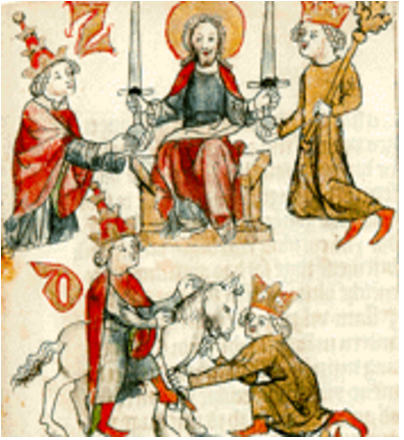Plenitudo potestatis on:
[Wikipedia]
[Google]
[Amazon]
 ''Plenitudo potestatis'' (Fullness of Power) was a term employed by medieval
''Plenitudo potestatis'' (Fullness of Power) was a term employed by medieval
Innocent III et les dÃĐbuts de la thÃĐocratie pontificaleÂŧ, dans ''MÃĐmoire dominicaine'', 21 (2007),
*
Julien ThÃĐry, ÂŦ Le triomphe de la thÃĐocratie pontificale, du IIIe concile du Latran au pontificat de Boniface VIII (1179â1303) Âŧ, in ''Structures et dynamiques religieuses dans les sociÃĐtÃĐs de lâOccident latin (1179â1449)'', ed. by Marie-Madeleine de Cevins et Jean-Michel Matz, Rennes : Presses Universitaires de Rennes, 2010, , online.
* Rizzi, Marco "''Plenitudo potestatis''. Dalla teologia politica alla teoria dello stato assoluto", dans ''Images, cultes, liturgies. Les connotations politiques du message religieux'', ÃĐd. P. Ventrone, L. Gaffuri, Rome, Paris, Ãcole Française de Rome, Publications de la Sorbonne, 2014, p. 49-60. *
Julien ThÃĐry-Astruc, ÂŦ Introduction Âŧ
in ''Innocent III et le Midi'' ('' Cahiers de Fanjeaux'', 50), Toulouse, Privat, 2015, p. 11-35, online].
 ''Plenitudo potestatis'' (Fullness of Power) was a term employed by medieval
''Plenitudo potestatis'' (Fullness of Power) was a term employed by medieval canonists
Canon law (from grc, ÎšÎąÎ―ÏÎ―, , a 'straight measuring rod, ruler') is a set of ordinances and regulations made by ecclesiastical authority (church leadership) for the government of a Christian organization or church and its members. It is th ...
to describe the jurisdictional power of the papacy. In the thirteenth century, the canonists used the term ''plenitudo potestatis'' to characterize the power of the pope within the church, or, more rarely, the pope's prerogative in the secular sphere. However, during the thirteenth century the pope's ''plenitudo potestatis'' expanded as the Church became increasingly centralized, and the pope's presence made itself felt every day in legislation, judicial appeals, and finance.
Although ''Plenitudo potestatis'' had been used in canonical writings since the time of Pope Leo I
Pope Leo I ( 400 â 10 November 461), also known as Leo the Great, was bishop of Rome from 29 September 440 until his death. Pope Benedict XVI said that Leo's papacy "was undoubtedly one of the most important in the Church's history."
Leo was ...
(440-461), Pope Innocent III
Pope Innocent III ( la, Innocentius III; 1160 or 1161 â 16 July 1216), born Lotario dei Conti di Segni (anglicized as Lothar of Segni), was the head of the Catholic Church and ruler of the Papal States from 8 January 1198 to his death in 16 ...
(1198â1216) was the first pope to use the term regularly as a description of papal governmental power.Brian Tierney, Foundations of the Conciliar Theory (Cambridge, 1955), pp. 144-149. Many historians have concluded that the pope's jurisdiction within the church was unchallenged. Essentially, the pope was the highest judge in the Church. His decisions were absolute and could not be abrogated by inferior members of the ecclesiastical hierarchy.
Bibliography (chronological order)
* Hof, Hans, "''Plenitudo potestatis'' und ''imitatio imperii'' zur Zeit Innocenz III", ''Zeitschrift fÞr katholische Theologie
The ''Zeitschrift fÞr katholische Theologie'' was a quarterly peer-reviewed academic journal established in 1877 at the Faculty of Theology at the University of Innsbruck. It was associated with the Society of Jesus. The journal published its last ...
'', 77, 1954â1955, p. 39-71.
* Watt, John A., "The Use of the Term plenitudo potestatis by Hostiensis", dans ''Proceedings of the Second International Congress of Medieval Canon Law (1963)'', ÃĐd. S. Kuttner, J. J. Ryan, CitÃĐ du Vatican, BAV, 1965, p. 161-187.
* Benson, Robert L. "''Plenitudo potestatis'' : Evolution of a Formula from Gregory VII to Gratian", dans ''Collectanea Stephan Kuttner. Studia Gratiana'' 14, 1967, p. 195-217.
* McCready, William D., "Papal ''Plenitudo Potestatis'' and the Source of Temporal Authority in Late Medieval Papal Hierocratic Theory", ''Speculum'' 48, 1973, p. 654-674.
* Marchetto, Agostino, "''In partem sollicitudinisâĶ non in plenitudinem potestatis'' : evoluzione di una formula di rapporto primato-episcopato", dans ''Studia in honorem eminentissimi cardinalis Alphonsi M. Stickler'', ÃĐd. R. J. Castillo Lara, Rome, Libreria Ateneo Salesiano, 1992, p. 269-298.
* KÃĐry, Lotte, "''De plenitudo potestatis sed non de jure''. Eine ''inquisitio'' von 1209/1210 gegen Abt Walter von Corbie (X, 5, 1, 22)", dans Licet preter solitum. ''Ludwig Falkenstein zum 65. Geburtstag'', ÃĐd. L. KÃĐry, D. Lohrmann, H. MÞller, Aix-la-Chapelle, Shaker Verlag, 1998, p. 91-117.
* Recchia, Alessandro, "L'uso della formula plenitudo potestatis da Leone Magno ad Uguccione da Pisa", Roma, Mursia, 1999.
* Schmidt, Hans-Joachim, "The Papal and Imperial Concept of plenitudo potestatis : the Influence of Pope Innocent III
Pope Innocent III ( la, Innocentius III; 1160 or 1161 â 16 July 1216), born Lotario dei Conti di Segni (anglicized as Lothar of Segni), was the head of the Catholic Church and ruler of the Papal States from 8 January 1198 to his death in 16 J ...
on Emperor Frederick II"", dans ''Pope Innocent III and his World'', ÃĐd. J. C. Moore, Aldershot, Ashgate, 1999, p. 305-314.
* Julien ThÃĐry, ÂInnocent III et les dÃĐbuts de la thÃĐocratie pontificaleÂŧ, dans ''MÃĐmoire dominicaine'', 21 (2007),
*
Julien ThÃĐry, ÂŦ Le triomphe de la thÃĐocratie pontificale, du IIIe concile du Latran au pontificat de Boniface VIII (1179â1303) Âŧ, in ''Structures et dynamiques religieuses dans les sociÃĐtÃĐs de lâOccident latin (1179â1449)'', ed. by Marie-Madeleine de Cevins et Jean-Michel Matz, Rennes : Presses Universitaires de Rennes, 2010, , online.
* Rizzi, Marco "''Plenitudo potestatis''. Dalla teologia politica alla teoria dello stato assoluto", dans ''Images, cultes, liturgies. Les connotations politiques du message religieux'', ÃĐd. P. Ventrone, L. Gaffuri, Rome, Paris, Ãcole Française de Rome, Publications de la Sorbonne, 2014, p. 49-60. *
Julien ThÃĐry-Astruc, ÂŦ Introduction Âŧ
in ''Innocent III et le Midi'' ('' Cahiers de Fanjeaux'', 50), Toulouse, Privat, 2015, p. 11-35, online].
Notes
{{reflistReferences
History of the papacy Canon law history Catholic Church legal terminology Holy See Papal primacy Catholic political philosophy